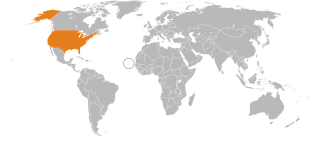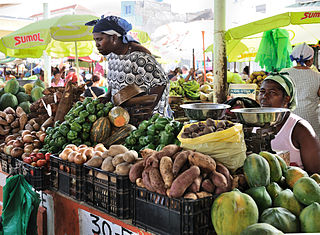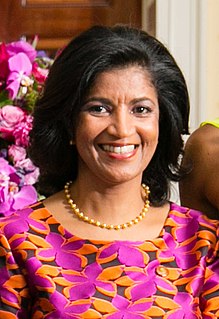Related Research Articles

Mozambique, officially the Republic of Mozambique, is a country located in Southeastern Africa bordered by the Indian Ocean to the east, Tanzania to the north, Malawi and Zambia to the northwest, Zimbabwe to the west, and Eswatini (Swaziland) and South Africa to the southwest. The sovereign state is separated from the Comoros, Mayotte and Madagascar by the Mozambique Channel to the east. The capital and largest city of Mozambique is Maputo.

Aristides Maria Pereira was a Cape Verdean politician. He was the first President of Cape Verde, serving from 1975 to 1991.

Portuguese is spoken in a number of African countries and is the official language in six African countries: Angola, Mozambique, Guinea-Bissau, Cape Verde, São Tomé and Príncipe and Equatorial Guinea. There are Portuguese-speaking communities in most countries of Southern Africa, a mixture of Portuguese settlers and Angolans and Mozambicans who left their countries during the civil wars. A rough estimate has it that there are about 14 million people who use Portuguese as their sole mother tongue across Africa, but depending on the criteria applied, the number might be considerably higher, since many Africans speak Portuguese as a second language, in countries like Angola and Mozambique, where Portuguese is an official language, but also in countries like South Africa and Senegal, thanks to migrants coming from Portuguese speaking countries. Some statistics claim that there are over 41,5 million Portuguese speakers in the continent. Like French and English, Portuguese has become a post-colonial language in Africa and one of the working languages of the African Union (AU) and the Southern African Development Community (SADC). Portuguese co-exists in Guinea-Bissau, Cape Verde, and São Tomé and Principe with Portuguese-based creoles, and in Angola, Mozambique, and Guinea-Bissau with autochthonous African languages.
Portuguese Africans are Portuguese people born or permanently settled in Africa. The largest Portuguese African population lives in Portugal numbering over 1 million with large and important minorities living in South Africa, Namibia and the Portuguese-speaking African countries .The descendants of the Portuguese settlers who were born and "raised" locally since Portuguese colonial time were called crioulos. Much of the original population is unnumbered having been assimilated into Portugal, Brazil, and other countries.
Cape Verdeans in Canada are Canadian residents whose ancestry originated in Cape Verde.
Cape Verdean Argentines are Argentine residents whose ancestry originated in Cape Verde. According to the 1980 census, there were about 8,000; but today's population was estimated by some sources to be around 2,000 in 2007. Other sources estimate that in 2006 there were 12,000-15,000 descendants of immigrants from Cape Verde living in Argentina, of whom about 300 are native to the African continent.
Cape Verdeans in France are residents of France who are from Cape Verde or have Cape Verdean ancestry.
In 1995, it was estimated that there were 50,000 people of Cape Verdean descent or national origin in Portugal. By 2000, this estimation rose to 83,000 people, of which 90% resided in Greater Lisbon." In 2008, Portugal’s National Statistics Institute estimated that there were 68,145 Cape Verdeans who legally resided in Portugal. This made up "15.7% of all foreign nationals living legally in the country."
Cape Verdeans in Luxembourg are Luxembourg residents whose ancestry originated in Cape Verde.
Cape Verdean Angolan are Angolan residents whose ancestry originated in Cape Verde.
Cape Verdean Spaniards are residents of Spain whose ancestry originated in Cape Verde.
Cape Verdean Gabonese are Gabonese residents whose ancestry originated in Cape Verde.
Cape Verdean Ivorian are Ivorian residents whose ancestry originated in Cape Verde.
Cape Verdean Cuban are Cuban citizens or residents whose ancestry originated in Cape Verde.

Cape Verde–United States relations are the international relations between Cape Verde and the United States.

The economy of Cape Verde is a service-oriented economy that is focused on commerce, trade, transport and public services. Cape Verde is a small archipelagic nation that lacks resources and has experienced severe droughts. Agriculture is made difficult by lack of rain and is restricted to only four islands for most of the year. Cape Verde's economy has been steadily growing since the late 1990s, and it is now officially considered a country of average development, being only the second African country to have achieved such transition, after Botswana in 1994. Cape Verde has significant cooperation with Portugal at every level of the economy, which has led it to link its currency first to the Portuguese escudo and, in 1999, to the euro.

Cape Verde or Cabo Verde, officially the Republic of Cabo Verde, is an archipelago and island country in the central Atlantic Ocean, consisting of ten volcanic islands with a combined land area of about 4,033 square kilometres (1,557 sq mi). These islands lie between 600 to 850 kilometres west of Cap-Vert situated at the westernmost point of continental Africa. The Cape Verde islands form part of the Macaronesia ecoregion, along with the Azores, the Canary Islands, Madeira, and the Savage Isles.
Cape Verdeans, also called Cabo Verdeans, are the citizens of Cape Verde, an island nation in West Africa consisting of an archipelago in the central Atlantic Ocean. Cape Verde is a sociedade mestiça, which means that it is home to mixed-race people, whose ethnogenesis is in Cape Verde, which has no indigenous population.

Cape Verde–Guinea Bissau relations refers to the bilateral relationship between the Republic of Cape Verde and the Republic of Guinea-Bissau. Cape Verde is an island country about 900 km north-west of Guinea-Bissau, a coastal West African country. Both were colonies of the Portuguese Empire and they campaigned together for independence with a plan for unification, but the countries separated after 1980.

Lígia Arcângela Lubrino Dias Fonseca is a Cape Verdean lawyer, activist, and politician who has served as the First Lady of Cape Verde since 2011. Fonseca became the first female president of the Cape Verdean Lawyers' Association (OAC), the country's national bar association, in 2001. She is married to Cape Verdean President Jorge Carlos Fonseca.
References
- ↑ 1995 Cape Verdean Diaspora Population Estimates Archived August 29, 2009, at the Wayback Machine
- ↑ Southern African Research and Documentation Centre. "Mozambique - Cape Verde - Elections" Archived July 20, 2011, at the Wayback Machine
- ↑ A Semana. "Elderly Cape Verdeans in Mozambique return home on visit after 50 years" [ permanent dead link ]